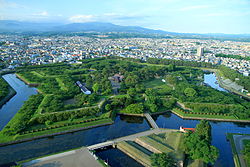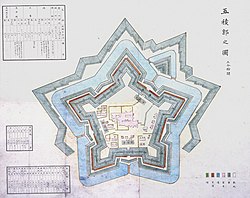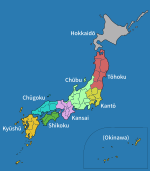Goryōkaku: Difference between revisions
Tag: Reverted |
|||
| Line 24: | Line 24: | ||
==History== |
==History== |
||
''Goryōkaku'' was designed in 1855 by [[Takeda Ayasaburō]]. |
''Goryōkaku'' was designed in 1855 by [[Takeda Ayasaburō]] and [[Jules Brunet]]. Their plans was based on the work of the French architect [[Vauban]].<ref name="nussbaum259"/> The fortress was completed in 1866, two years before the collapse of the [[Tokugawa Shogunate]]. It is shaped like a five-pointed star. This allowed for greater numbers of gun emplacements on its walls than a traditional Japanese fortress, and reduced the number of blind spots where a cannon could not fire. |
||
The fort was built by the [[Tokugawa shogunate]] to protect the [[Tsugaru Strait]] against a possible invasion by the |
The fort was built by the [[Tokugawa shogunate]] to protect the [[Tsugaru Strait]] against a possible invasion by the [[Meiji government]].<ref name="nussbaum259"/> |
||
Goryōkaku is famous as the site of the last battle of the [[Boshin War]]. The fighting lasted for a week (June 20–27, 1869).<ref name="nussbaum259"/> |
Goryōkaku is famous as the site of the last battle of the [[Boshin War]]. The fighting lasted for a week (June 20–27, 1869).<ref name="nussbaum259"/> |
||
Revision as of 16:30, 26 January 2022
You can help expand this article with text translated from the corresponding article in Japanese. (January 2021) Click [show] for important translation instructions.
|
| Goryōkaku | |
|---|---|
五稜郭 | |
| Part of Boshin War | |
| Near Hakodate in Japan | |
 Goryōkaku viewed from Goryōkaku Tower | |
Governmental hall of the Republic of Ezo | |
| Coordinates | 41°47′49″N 140°45′25″E / 41.79694°N 140.75694°E |
| Type | Star fort |
| Site history | |
| Built | 1866 |
| Built by | Takeda Hisaburō |
| Battles/wars | Boshin War |
 19th century map of Goryōkaku | |
Goryōkaku (五稜郭) (literally, "five-point fort") is a star fort in the Japanese city of Hakodate on the island of Hokkaido.[1][2] The fortress was completed in 1866. It was the main fortress of the short-lived Republic of Ezo.
History
Goryōkaku was designed in 1855 by Takeda Ayasaburō and Jules Brunet. Their plans was based on the work of the French architect Vauban.[1] The fortress was completed in 1866, two years before the collapse of the Tokugawa Shogunate. It is shaped like a five-pointed star. This allowed for greater numbers of gun emplacements on its walls than a traditional Japanese fortress, and reduced the number of blind spots where a cannon could not fire.
The fort was built by the Tokugawa shogunate to protect the Tsugaru Strait against a possible invasion by the Meiji government.[1]
Goryōkaku is famous as the site of the last battle of the Boshin War. The fighting lasted for a week (June 20–27, 1869).[1]
Park
Today, Goryōkaku is a park declared as a Special Historical Site, being a part of the Hakodate city museum and a citizens' favorite spot for cherry-blossom viewing in spring.
See also
- List of Special Places of Scenic Beauty, Special Historic Sites and Special Natural Monuments
- Benten Daiba, another key fortress of the Republic of Ezo
- Citadel Hill, a similar shaped fortress in Nova Scotia, Canada
- Fort Bourtange, a similarly-shaped fortress in the Netherlands.
- List of foreign-style castles in Japan
- Palmanova
References
- ^ a b c d Nussbaum, Louis-Frédéric (2002). Goryōkaku. Translated by Kathe Roth. London, England: Harvard University Press. p. 259. ISBN 0-674-00770-0.
{{cite book}}:|work=ignored (help) - ^ Hinago, Motoo (1986). Japanese Castles. Kodansha International Ltd. and Shibundo. pp. 131–133. ISBN 0870117661.
Further reading
- Benesch, Oleg and Ran Zwigenberg (2019). Japan's Castles: Citadels of Modernity in War and Peace. Cambridge: Cambridge University Press. p. 374. ISBN 9781108481946.
- De Lange, William (2021). An Encyclopedia of Japanese Castles. Groningen: Toyo Press. p. 600. ISBN 978-9492722300.
- Schmorleitz, Morton S. (1974). Castles in Japan. Tokyo: Charles E. Tuttle Co. p. 144. ISBN 0-8048-1102-4.


